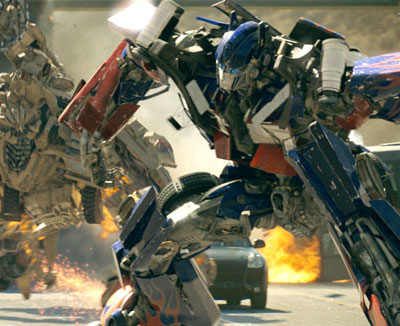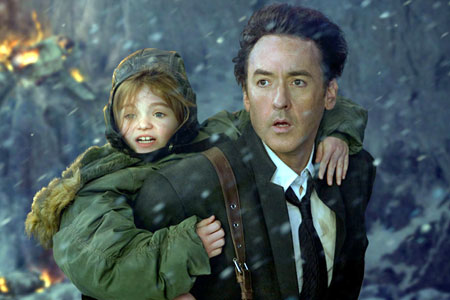Independence Day (1996, 20th Century Fox)
Godzilla (1998, Tristar Pictures)
Transformers (2008, Dreamworks)
2012 (2009, Columbia Pictures)
The aim of this piece is to spot the shift both in plot and ideology from the films pre-September 11th to those that are more recent. While there are, obviously, films that may not fully conform to this (Nicolas Cage's output in the 90s particularly seems to be more introverted.) there is certainly the sense that the mid to late 90s showed a sense of America's output to other countries, to show America as peacekeepers of the world.
More recent films, however, have emphasised America's inability to both prevent, or control, attacks from foreign films. While it is 2012 that will be discussed, certainly Emmerich's other output, The Day After Tomorrow not only conforms to this, but also plays into 2012's fear of global catastrophe - however, it places the blame of this upon the world's shoulders - another level of allegory.
The aim therefore, is three fold - Firstly, I will explain how, briefly, and without dwelling in detail, on the effects of September 11th on America - much of this from my own experience (I lived in America from 1999-2002, and visited New York both in July 2001, and 2002.) I am not intending this to be comprehensive, and will be the first to state that there is much writing on this already - in fact, much of what I discuss is based on Dixon's Film and Television After 9/11. Secondly, I will aim to show how both Independence Day and Godzilla demonstrate a pro-American point of view; one that is specifically focused on America's ability, both as a community and ideologically, to 'solve' the world's problems. These are problems that - like films post September 11 - are not America's fault, but ones in which America finds the way to fix.
Finally, I will show how films after September 11th, particularly, Transformers and 2012 represent a post 9/11 view, one of more hopelessness, one of survival, and one in which American ideals, whilst not sidelined, are shown as not fully effective at solving the problems of the diegetic worlds.
Pre September 11th, it could be argued that America saw itself as 'invulnerable' and a country of ideals that were not questioned, ones that held democracy and strength as hallmarks of its Nation. Films, therefore reflected this trend to strength - the American Hero, the ideals of truth, freedom and democracy seen as ones that should be held throughout the world.
It may be argued that this could be seen as 'cockiness' by other countries, however, it was certainly one that put an emphasis on America's achievements.
After September 11th, one of the strongest feelings in my immediate circles of friends was one of shock, that America could be seen as a target, that someone would 'dare' to attack it. This immediate feeling of weakness certainly translated into a feeling of humbleness, something I personally witnessed on a trip to New York, where the once brash, loud citizens of the city transformed into well mannered, quiet people. Something certainly changed in the country. While once, America could be seen as a bastion of ideals that the world should follow, post September 11th, these ideals changed, and could be questioned.
This piece is certainly not a critique of American politics, and I do not wish to dwell on them too long. However, the clear shift in attitude of the country as a whole must be taken into account before examining the following texts.
Pre 9/11.
Both Godzilla and Independence day share the same ideal around their central conflict. This is that the problems of the film are not created by America. While the films post Sept 11 are also of foreign origin, it seems more important that the 'villains' of the pre 9/11 films are worth examining. In Independence Day, it is blatantly, the aliens, those that have no concept of human (read - American) democracy. They invade without warning, they pose ominously over the most important cities of society, without reason, and without (so it seems) motive. It is this lack of motive that is most interesting. There is no reason to attack America (or, of course, the other cities in the film, but America is where it focuses). There is no complaint with America's politics, its policies, or its ideals, or indeed its people. There is a simple enemy that, with its lack of reasoning, or its ability to communicate with its nemesis, represents everything that can be seen as anti-American.
More than this, the hero that actually manages to save the world is (what can best be described as) John Q. Everyman - a 'white trash' trailer bound American, one who represents the best of America - individual, deeply heroic, family oreinted, despite his outward flaws. And he destroys the ships with a WW2 era plane.
Finally, the last important aspect to examine is the seemingly flippant line at the end of the film -
"Get on the wire, tell them how to bring those sons of bitches down."
Effectively, this is America using its own knowledge and experience to influence the rest of the world. The following montage of world cities, utilising the American Way to tear down the alien ships conforms to this idea - that America and its ideals are the way to deal with conflicts, and that they will not only deal with, but triumph and restore an equilibrium to the world.
Godzilla, while set in the US, is interesting in its concept - that the enemy was created on this planet - by the French. By radiation. And it then attacks Japanese ships. There is surely some sort of re-writing of WW2 history here. Perhaps the most galling concept is the idea that a radiation attack upon the Japanese was not in anyway influenced by the Japanese. Indeed, America in many ways disowns its own history of nuclear attacks, claiming that it would not dare to release such attacks. This is emphasised by Matthew Broderick's Dr. Niko character (someone channelling the mish-mash of cultural identities that ultimately created America) who constantly chastises the attacks throughout the film.
Once again, however, it is the Americans that 'solve' the problem and bring down the creature, not of their own making, this preventing it from attacking any other nation. Again, it is a combination of the American miliatry and an individual American 'everyman' that bring the creature down. And once more, it is the case that America, and its multicultural, intelligent democracy can fix problems of not only its own country, but of others.
Post 9/11.
It is perhaps remiss to mention Pearl Harbour - one of the last films to be released prior to 9/11. While America is indeed attacked in the film, there is not (despite fleeting *less than 1 min sequences*) any reason to empathise or explain the Japanese motives for the film.
Post 9/11, films such as Spiderman, Zoolander etc changed their landscape and sequences. Spiderman, most explicitly, ended with an American Flag in full view as Parker reached his potential, the innocent, attacked individual rising up against the pressures of the outside world. Whilst this is certainly a trend of films, it is interesting to examine the idea that films have more reflected the concept that America is not immune from the horrors of the world.
Transformers perhaps best exemplifies the post 9/11 mentality. This is most apparent in its Army/Marine storyline. The men are seen as out of their comfort zone, and ones who, whilst manage to adapt to the situation around them, are out of their depth, and ultimately unable to influence the actual events of the film.
Once more, aliens attack the world. Unlike Independence Day, however, the US does not manage to resolve the issue - they are unable to even deal with the concept. In fact, one of the key emotional sequences involves the 'unfair' capture of one of the 'good' aliens, perhaps referencing Guantanamo Bay style methods - in effect, criticising the very country that the film is created for. The army, whilst managing to survive, do not in anyway really influence the outcome of the film. This is the key idea that permeates post 9/11 film. That America is concerned with survival, and survival of its ideas against outside influences. The American ideals do indeed remain, but it is ultimately the Autobots that triumph in the film, and who end up 'protecting' the earth. America, in many ways is left with its 'pants down' (thank you, Turturro) against the alien outsider.
A far cry from Independence Day.
Finally, 2012. In my own memory, there has not been a blockbuster American film that has taken as many influences from as many other cultures as possible (obviously primarily Russian). Not only this, but the outside influence (that is not even human, but completely UNAVOIDABLE - a comment on terrorism?) is one that affects the whole world - perhaps explaining that any problem that affects the US affects the whole world. Does this then 'sell' America again in a manner similar to the pre 9/11 films?
While the protagonist of the film is once again American, his family is disintegrated (although he ultimately reunites with them) and is not the sole hero of the film. Indeed, the President of the United States is killed, as is Washington DC. Does this perhaps state that America now realises it is not the only nation in the world? That its ideals are not THE answer to society's problems?
Some may argue that blockbusters are unimportant in terms of filmic value. Far from this. As they need to endear themselves to the world, they need to reflect current world sensitivities, and push away from common world views. Consider the GI Joe film - a title shift away from 'Real American Hero', right?
Perhaps, for the next trends in current world view, we should look to the biggest films in the world.




